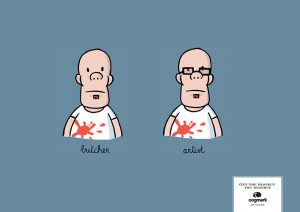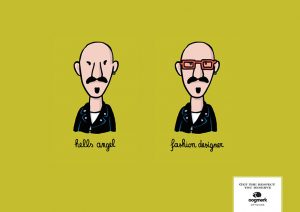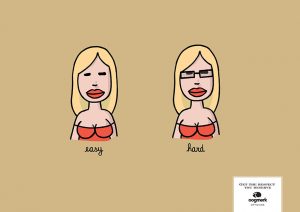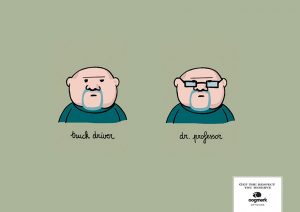This glasses brand presented these ads with the tagline: “get the respect you deserve.” So it’s pretty upfront about the extra things it is trying to sell beyond just glasses, it’s selling respect, status, and a particular image. However, the dichotomies here are interesting in that they reveal bias, though it is unclear whether it is company bias or our own cultural biases. It goes from hell’s angel to fashion designer, butcher to artist, ‘easy’ to ‘hard,’ and truck driver to ‘Dr. Professor.’ In theory, these go from low-status descriptions or occupations to high-status occupations, from the addition of glasses. Glasses are associated with intelligence, though this can easily go towards the negative (nerd stereotype). Ogmerk is trying to put a positive spin on this. But why is an artist more respected than a butcher? Neither butcher nor artist requires a degree, and a butcher is a steady trade, while an artist is often by commission/gig/income by the amount of art you sell. Similarly, why is a fashion designer more respected than a motorcyclist? Truck drivers make about the same amount of money on average as professors but get much less respect. At first glance, none of the images would be immediately recognizable without the labels underneath. And finally, the ‘easy’ vs ‘hard’ version, implies that attractive women without glasses are seen as sexually promiscuous, while those with glasses can play ‘hard to get,’ with the sexual promiscuity being less favorable. In neither of those situations, however, is the woman’s attractiveness tied to the glasses, just the amount of respect she receives from others. Additionally, the other slides are about an occupation, not a sexual description, which is a bit suspect in this gendered context.
I found this ad on a list of “powerful and creative ads,’ so it clearly works. But some of the implications that it gives to certain professions and appearances make me take a second look. What if you are a hell’s angel, or a butcher, or a truck driver? Then this ad is telling them that these glasses are not for them, that they should be ashamed of their status, and instead look like some other occupation group. This alienates Ogmerk’s potential low-status consumers but also solidifies its position as a high-status brand.





This is quite the ad. It’s a good thing we have been trained by critical thinking to look past the stereotypes of ads or else I would feel quite compelled to go switch my contacts out for glasses. I think you make an interesting point that the ad’s assumption that the ‘better’ careers or social positions can be alienating those who fall under the ‘less desirable’ category and therefore decreasing the effectiveness of the ad.